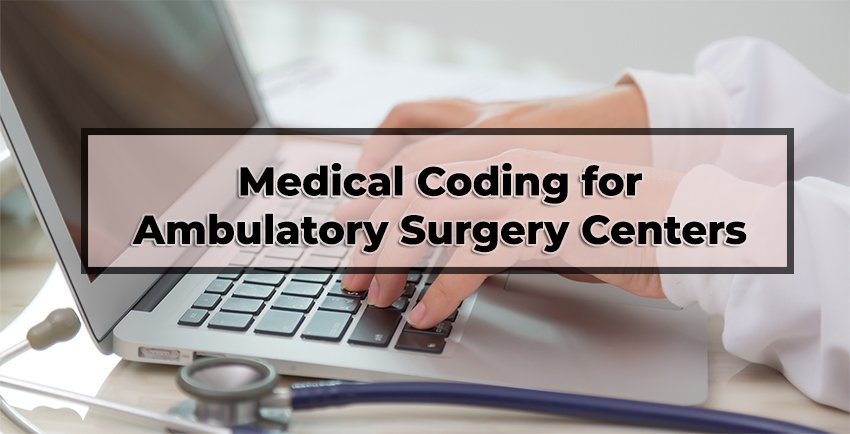Medical Coding for Ambulatory Surgery Centers
Ambulatory Surgery Centers (ASCs) are specialized medical facilities that provide surgical care on an outpatient basis. These centers allow patients to undergo surgeries and procedures without needing hospital admission, making them a cost-effective alternative for many elective surgeries. Procedures performed in ASCs range from minimally invasive surgeries to complex procedures like joint repairs, endoscopies, and cataract surgeries. ASCs focus on delivering high-quality care while reducing hospital-associated costs and shortening recovery times.

Accurate coding in ASCs is critical for capturing the procedures performed, ensuring appropriate reimbursement, and maintaining compliance with payer guidelines. Coders working with ASCs must be proficient in CPT (Current Procedural Terminology) codes, HCPCS (Healthcare Common Procedure Coding System) codes, and ICD-10-CM codes to properly document the surgeries and services provided. Proper medical coding also helps in tracking outcomes and optimizing the facility’s efficiency.
Core Elements of Coding in Ambulatory Surgery Centers
Coding for ASCs requires attention to detail, as the services provided span multiple specialties, from orthopedics to gastroenterology. Coders must capture each procedure, anesthesia service, and postoperative care accurately to reflect the care delivered.
1. Surgical Procedures in ASCs:
ASCs perform a wide range of outpatient surgeries. For instance, CPT code 29881 is used for an arthroscopy of the knee with meniscectomy, while 66984 covers cataract surgery with insertion of an intraocular lens.
Coders must ensure that the specific procedure performed is captured accurately using the correct CPT codes. Special care must be taken when coding for bilateral surgeries or multiple procedures performed during the same session.
2. Anesthesia Services:
Anesthesia is commonly used in ASC procedures, and coders must document the type and level of anesthesia provided. CPT code 00142 is used for anesthesia for cataract surgeries, while CPT code 01382 covers anesthesia for knee arthroscopy procedures.
Coders must also apply modifiers, such as modifier -59 for distinct procedural services, when different areas of the body are operated on, or modifier -51 for multiple procedures performed in the same session.
3. Postoperative Care:
Postoperative services, such as pain management and wound care, are essential components of ASC services. Coders must document any follow-up care provided using appropriate codes like CPT code 99024, which covers postoperative follow-up visits.
ASCs often focus on rapid recovery and short-term postoperative care, so coders need to accurately track and code all postoperative services provided, particularly when complications arise.
Unique Considerations in ASC Coding
There are several unique aspects of ASC coding that coders must be aware of, particularly regarding the payer’s coverage guidelines and the correct use of codes for surgical services provided in an outpatient setting.
ASC-Specific Payment Systems:
Medicare reimburses ASCs under the ASC Payment System, which is distinct from hospital outpatient department (HOPD) billing. Coders must ensure they are familiar with the ASC-specific codes and payment systems to ensure accurate reimbursement. Each procedure is assigned a specific payment group under the ASC payment schedule, and coders need to apply the corresponding codes correctly.
Coders should also be aware of whether a procedure is covered in the ASC setting. Some procedures may only be reimbursable if performed in a hospital or inpatient setting, so it’s important to verify the eligibility of procedures for ASC reimbursement.
Use of Modifiers in ASC Coding:
Correct modifier usage is critical in ASC coding to reflect services accurately. For instance, modifier -52 may be used to indicate a reduced service, while modifier -73 applies when a procedure is discontinued after anesthesia is administered but before the surgical incision.
Coders must apply these modifiers accurately to ensure correct billing and avoid claim rejections. Understanding how modifiers impact reimbursement in the ASC setting is essential for successful coding practices.
Challenges in ASC Coding
One of the primary challenges in coding for ASCs is managing multiple procedures within a single session. Coders must accurately document each procedure and apply the appropriate modifiers to differentiate services. Errors in documenting multiple procedures or services can lead to underbilling or overbilling, both of which have serious financial implications for the center.
Another challenge is staying up-to-date with the ASC-specific rules and payment guidelines. Medicare and private payers often update their policies, and coders must remain informed about these changes to ensure compliance. This includes understanding which procedures are covered under ASC settings and ensuring that the coding reflects any changes to billing practices.
Best Practices for Accurate ASC Coding
Verify Procedure Eligibility: Coders must ensure that procedures performed in ASCs are eligible for reimbursement under the payer’s guidelines. Verifying that a surgery can be coded and billed in the ASC setting helps prevent claim rejections.
Accurate Modifier Use: Coders should be diligent in applying modifiers to differentiate between multiple surgeries or services performed in a single session. Using the appropriate modifiers helps ensure correct billing and full reimbursement for all services provided.
Stay Updated on Payment Policies: Coders should regularly review ASC-specific guidelines and payer policies to stay informed about any changes. This includes understanding the Medicare ASC Payment System and private payer rules for outpatient surgical procedures.
Medical coding for Ambulatory Surgery Centers (ASCs) is essential for documenting outpatient surgical services and ensuring proper reimbursement. Coders play a vital role in capturing the wide range of procedures and services provided in ASCs, from anesthesia to postoperative care. By using accurate CPT codes, HCPCS codes, and ICD-10-CM codes, coders support the financial stability of ASCs while ensuring compliance with payer guidelines.
As the popularity of ASCs grows, coders must stay informed about ASC-specific rules, payment systems, and coding best practices to maintain accurate and compliant billing. Through precise coding, coders help ensure that patients receive high-quality, cost-effective care in outpatient surgery settings.

